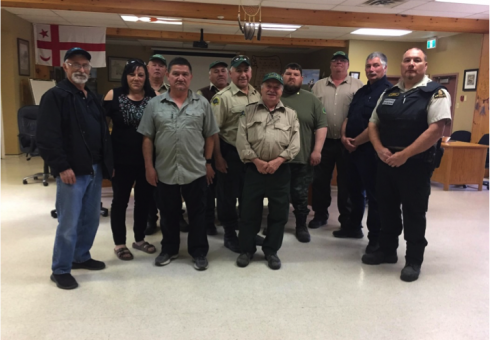The ‘Lessons Learned Tour’: NunatuKavut Guardians and Miawpukek Conservation Officers Share 40 Years of Collective Experience

“We called our community visit the “Lessons Learned Tour”. Although we have been crossing paths with the Miawpukek Natural Resources Department staff at meetings for years, I knew that there would be nothing better than my NunatuKavut Guardians staff taking some time to meet with the Miawpukek Conservation Officers in person, so they could get out in the field together and talk about how things are done on the ground.”
Stan Oliver, Fisheries and Oceans Coordinator, NunatuKavut Community Council
Both the NunatuKavut Community Council (NCC) and the Miawpukek First Nation (MFN) operate a comprehensive Food Fisheries Program in their perspective communities. With over 40 years of collective experience by local guardians, the Aboriginal Fisheries Guardian Program is designed to support the management, protection and enforcement of the NCC and MFN Communal Fishing activities within their respective territory and reserve area. The Guardians work closely with DFO Fisheries Officers and on many occasions are the first line of communication with NCC/MFN membership - educating members about licenses, reporting violations, fish and fish habitat, monitoring and reporting.
So it was a natural fit for the two communities to organize a community exchange to discuss mutual issues and to see first hand how each Nation operates their programs on the ground. In June, three NCC Guardians travelled to Conne River, NL to spend time with staff from MFN. They met in the office, sharing program presentations to kick things off. A highlight was hearing from Miawpukek’s DFO liaison officer about how their restorative justice system works for reporting and addressing violations with Chief and Council.
Issues that were discussed included the impacts of overfishing of salmon and cod stocks and the challenges of not being formally recognized as a Nation by the provincial government. There was also much discussion about how the MFN program operates safely in the field, including discussions about safety field equipment and whether Guardians need to carry defensive weapons for added protection. The MFN Conservation Officers do self-defense training every year that gives them greater comfort when on the job.
The NCC Guardians travelled out in the field to visit a salmon counting fence and learned how to distinguish farmed salmon from wild Atlantic salmon by observing scale samples. Farmed salmon are larger and show physical defects from being in cages. The MFN have observed an alarming decline in salmon passing through the counting fence, from as many as 900 fish in recent years to only 9 fish last year.
“We all felt it was a great way to share our work experiences and the different activities we do for our organizations. The MFN Conservation Officers are looking forward to coming to our territory to see how we operate and to see how truly vast our territory is.” George Morris, Senior Fishery Guardian, NCC
If your Indigenous Guardian program is interested in conducting a community visit, apply for funds from Nature United.